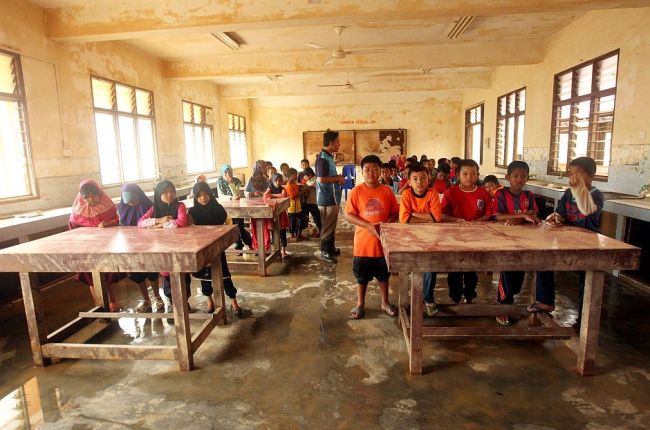MANEK URAI, Malaysia ― It was like a war zone, everything was in ruins. What was sadder still was that things were just the way they had been when I came to this town 100 km from Kota Baru a week ago.
The road was not visible. It was fully covered in wet mud, in some places as high as my waist, and I stand at 168 cm.
En route to Manek Urai, my car skidded a few times as I revved my engine to get through the mud. It was around 6 a.m. but the early morning beauty of the rural setting was nowhere to be seen.
The place still reeked of mud and garbage and there was an eerie silence about the place, as if the floodwaters had washed away the hopes of the people and the soul of the village.
My photographer and I parked the car at a safe distance from SK Manek Urai as the mud around the school area was too high.
The road was not visible. It was fully covered in wet mud, in some places as high as my waist, and I stand at 168 cm.
En route to Manek Urai, my car skidded a few times as I revved my engine to get through the mud. It was around 6 a.m. but the early morning beauty of the rural setting was nowhere to be seen.
The place still reeked of mud and garbage and there was an eerie silence about the place, as if the floodwaters had washed away the hopes of the people and the soul of the village.
My photographer and I parked the car at a safe distance from SK Manek Urai as the mud around the school area was too high.

We made our way into the school which looked empty, ruined and haunted ― but it was clean on the inside. The students struggled as they slowly made their way to school.
The mud was slippery and I was choked with emotion when I saw an elderly man, probably around 60, carrying his 12-year-old twins.
No books, no bags, no shoes, no uniforms. Many of them looked like they were just taking a morning walk by the school, yet here they were to start their first day of school for the year.
The students were extremely shy but never stingy with their smiles.
They were happy to be back at school and they took me around and showed me their empty classrooms and staff rooms.
As I looked at the village from the fourth floor, all I could see was an orange sea of trash and mud.
Overwhelmed, I asked some of the mothers why there has been little progress in the cleanup. The reply brought a lump to my throat ― “cleaning up will mean throwing away the remnants of our homes, and that is all we have left to hold on to.”
But even in the midst of all that misery, the students were in high spirits. The pupils, aged 7 to 12, had burning spirits and cheered as their headmaster asked them to help rebuild the school.
For rebuilding to be of any effect, there is a need for a change in mindset and civic consciousness.
The village was filled with rubbish everywhere and still, some could bring themselves to throw food packets out of their cars.
As I walked past larger drains, I saw them clogged with garbage.
It wasn’t just Manek Urai. In Kuala Krai, Kota Baru and any other town that I had seen over the past 10 days, it was always rubbish everywhere.
The people do not ask questions and always submit to everything.
“It is okay, it has happened.” That was the attitude.
And it does not bode well for the future of the children so excitedly making their way to a mud-caked school.
By D. Kanyakumari
(The Star)
-
Articles by Korea Herald







![[Graphic News] More Koreans say they plan long-distance trips this year](http://res.heraldm.com/phpwas/restmb_idxmake.php?idx=644&simg=/content/image/2024/04/17/20240417050828_0.gif&u=)
![[KH Explains] Hyundai's full hybrid edge to pay off amid slow transition to pure EVs](http://res.heraldm.com/phpwas/restmb_idxmake.php?idx=644&simg=/content/image/2024/04/18/20240418050645_0.jpg&u=20240419100350)






![[From the Scene] Monks, Buddhists hail return of remains of Buddhas](http://res.heraldm.com/phpwas/restmb_idxmake.php?idx=652&simg=/content/image/2024/04/19/20240419050617_0.jpg&u=20240419175937)

![[KH Explains] Hyundai's full hybrid edge to pay off amid slow transition to pure EVs](http://res.heraldm.com/phpwas/restmb_idxmake.php?idx=652&simg=/content/image/2024/04/18/20240418050645_0.jpg&u=20240419100350)

![[Today’s K-pop] Illit drops debut single remix](http://res.heraldm.com/phpwas/restmb_idxmake.php?idx=642&simg=/content/image/2024/04/19/20240419050612_0.jpg&u=)